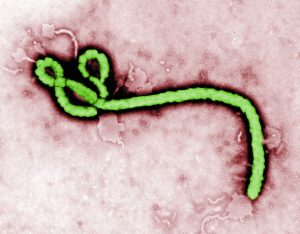
Last week, two scientific discoveries were announced that could lead to better and earlier treatments for persons with Ebola virus disease.
First, scientists at University of Texas Medical Center in Galveston have discovered a protein within the body’s immune system that plays a central role in Ebola infections. Ebola virus infections are known to cause severe disease because of the virus’s effect on an individual’s immune system. T-cells, a type of white blood cell that locates and destroys cells that are infected by viruses, are especially vulnerable to Ebola virus. In their study, scientists demonstrated that mice that were genetically engineered without the T-cell protein Tim-1 became less ill after becoming infected with Ebola virus, compared to unmodified mice.
Further research with immune cells donated from humans elucidated to the scientists that the Ebola virus binds to T-cells via the Tim-1 protein, and causes extensive inflammation that impedes the immune system. This inflammation has been linked to the severity of the disease, as well as the likelihood of death. One possible outcome of this study is to determine if treatments that block the Tim-1 protein would result in milder disease and fewer deaths due to Ebola.
Another discovery by researchers at Northumbria University in Newcastle has led to a new diagnostic platform for Ebola that is faster and safer. Previously, persons with Ebola-like symptoms would provide a blood sample that required evaluation by a highly-specialized laboratory, which would then require 5-8 hours for confirmation. This new diagnostic platform requires much less sample (approximately one drop of blood), and needs less than 70 minutes to complete.
This new technology will provide results that are comparable to previous, laboratory-based systems, and can be administered by persons with less training and for less cost. Additionally, this technology has broader applications, due to its use of genomic detection; future uses could include Zika, dengue, MERS, or other viruses, as well as parasitic or bacterial infections, such as malaria or meningitis.
It is not enough to focus Ebola research on vaccine development; a multi-pronged plan for research and development is necessary to not just prevent illness, but detect and treat illness. Research efforts such as these in Galveston and Newcastle exhibit how the world is preparing for the next Ebola outbreak, as well as working towards defeating the disease.
Latest
Legal Comments on Medicare’s Site-Neutrality Proposal: A Preview of Potential Litigation
Katie Keith Suhasini Ravi



